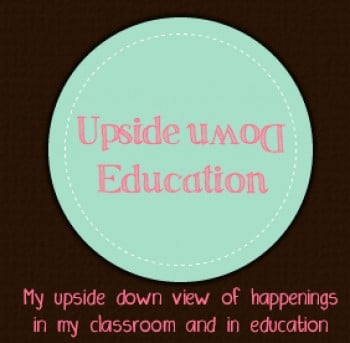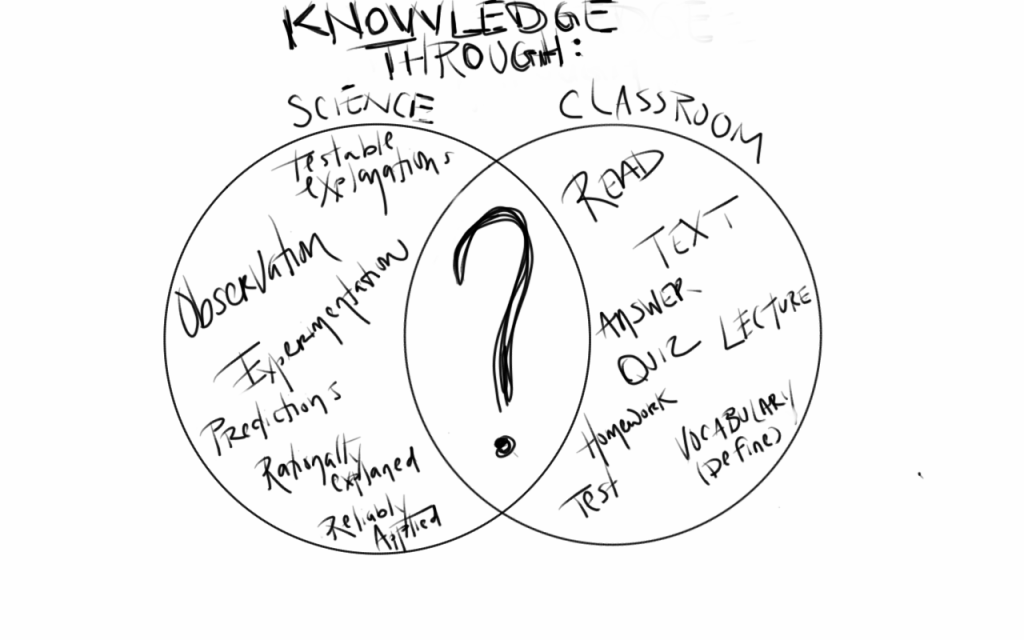OK humor me for a moment. Think back on science classes you took as a kid? What was the class like? How about science in your classroom? What are students doing the majority of the time? How are they assessed? OK now hold that thought.
Now let’s look at the definition of science. Dictionary.com defines it as “systematic knowledge of the physical or material world gained through observation and experimentation.” When you look science up on Wikipedia it says “a systematic enterprise that builds and organizes knowledge in the form of testable explanations and predictions about the universe. In an older and closely related meaning, “science” also refers to this body of knowledge itself, of the type that can be rationally explained and reliably applied.” Hmmmmm. I see:
Knowledge of the world through:
observation
experimentation
Builds knowledge in form of testable:
explanations
predictions
Body of knowledge that can be:
rationally explaned
reliably applied
Summed up it’s knowledge gained from observation, extermination that can be explained and applied.
Back to science classes. Let’s look at the typical science class. Before I get push back, I know not everyone does this, but know I spend a lot of times in many different schools and was a science teacher for years. Most of the time here’s a typical unit:
Students read from text.
Students answer questions about said text in form of worksheets or questions at end of section.
Teacher lectures on topic. Students take pages and pages of notes. Lecture probably will include video.
Homework may include define words.
One day of unit may be focused on a hands on experiment related to the topic.
Quizzes and a final test.
Agree? Is this what most science you’ve experienced in your lifetime look like? At one point of my life I taught science this way. If we did a venn diagram of science vs science class, would we have anything in the middle? Or would it look like this:
I used to tell my students don’t use a venn diagram if you don’t have a middle. You are no longer comparing it is just contrast because they obviously have nothing in common.
I speak all the time online or at conferences about STEM and PBL and why it is important for us to change our teaching. And this is exactly why. We are not teaching science. We are teaching facts. We are really teaching reading comprehension. I am in schools all the time where teachers are telling me they don’t have time to teach science so they do it during reading. But science is gaining knowledge through all that other stuff above, not through just reading.
Our students are missing out on learning how to experiment, observe, make predictions, and apply knowledge. So really, we aren’t teaching science, we are teaching kids to read. Then we punish those who were too bored to pay attention during the reading or had trouble paying attention during lectures. No child should ever fail science because he or she was bad at reading comprehension or bad at paying attention to lectures. Yes, they need to read, but they also need to have scientific skills. There is this thing called the STEM Gap that refers to there not being enough people to fill STEM jobs. 40% of employers cannot find applicants that have degrees in the STEM fields nor can they find employees with the problem solving and inquiry skills needed in today’s world.
We have to make the effort to teach science as science. Had a teacher the other day tell me she didn’t have time to teach her science curriculum and do PBL. Told her great. Throw away her science curriculum. Instead of worksheets do inquiry activity during that time. Allow kids to research, apply the information, evaluate their ideas, then create something. Science should be all about curiosity. If students are not getting to be curious, you’re probably doing it wrong.
Things have to change because I really do not want to live in a world of compliant readers, I want to live in a world of problem solvers who are making an effort to make our world a safer place.

